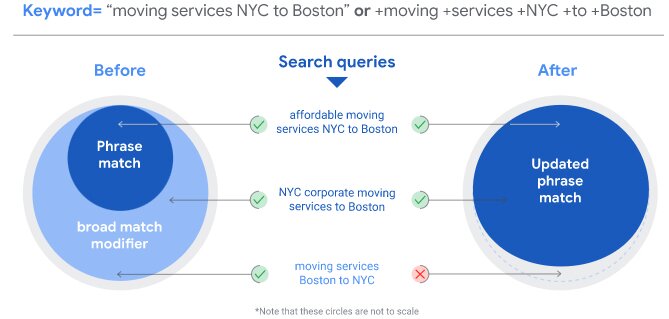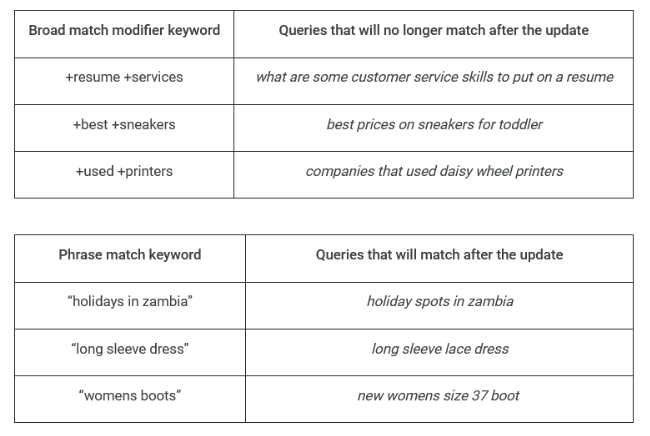Google Ads Update: Removing the Broad Match Modifier
SEM, or Search Engine Marketing, is a facet of digital marketing that a lot of advertisers, marketers, and website owners use to improve their search visibility and have an immediate boost in visits. But this has its downsides as well. Spending money just to attract visitors is a choice not a lot of SMEs can make. But for the capable ones, using broad match modifier for their target keywords is a valuable asset that is consistently used. However, Google has recently announced that they’re removing the broad modifier function for their ads services. What does this entail for paid search marketers and even website owners that rely on ads?
What are Broad Match Modified Keywords?
Broad match modified keywords are broad match keywords but are modified to set some or all of the words inside the keyword as mandatory for targeting. For example, the keyword you’re targeting for your ads is “laptops for sale”. If you want to modify this keyword, you just have to add the “+” symbol at the beginning of the word.
This means that if you want the word “laptops” to always be present in the keywords that your ads show up in, you add the “+” at the beginning of the word “laptops”. Or if you want your ads to show up in all the keywords that contain the “laptops” “for” “sale” you add the “+” symbol at the beginning of all the words. Here’s a clearer representation:
| Keyword | Possible Targeted Keywords |
|---|---|
| Laptops for Sale | Affordable laptops for sale Lenovo thinkpad store Laptop store |
| +laptops for sale | Laptop prices Work from home laptops for sale Best Laptop store |
| Laptops +for sale | Laptops for online classes PC for sale Laptops for gaming |
| Laptops for +sale | Laptop parts for sale Pc parts for sale Laptops on sale |
| +laptops +for +sale | Laptops for sale Affordable laptops for sale Laptop parts for sale Work from home laptops for sale |
Updating Phrase Match Keywords
Through the announcement, Google informed us that broad match modified keywords will now be under Phrase Match keywords. This means that they’re removing the process of manually modifying broad match keywords and integrating it to the Phrase Match process of keywords.
What is the difference between Phrase Match Keywords and Broad Match Modified Keywords?
The primary between the two is that broad match modified keywords, necessitate that the presence of some words in the keyword, i.e. laptops in “+laptops for sale”, must be present in the search query that the ad shows up on. While Phrase Match keywords necessitate the order of the words in a search query, i.e. the order of words in “laptops for sale” should be present in the search query that the ad shows up in.
Phrase Match and Broad Match Modified Keywords
As mentioned, Google will now be integrating Broad Match Modified keywords into the Phrase match version. So, in addition to the traditional effect, the broad match modified keywords have, the order of words will now be considered as well. They provided a great example to help webmasters and paid search marketers better understand the update:

In the example above, aside from still retaining the traditional effect of broad match modified keywords, the order of words will be considered now as well to deepen the understanding of the Ads algorithm on the intent of the search query to improve the targeting of the ads.
Google provided other examples as well to provide a better understanding of the update:

Pros and Cons of the Phrase Match Update
Pros: To use our understanding of the Phrase Match update, we can assume that the ads we create will be better targeted. This means that our ads will show up on the search queries that matter the most. Let’s take the “moving services NYC to Boston” keyword as an example. Through the update, we’ll be able to avoid our ads showing up on search queries that have little to no chances of attracting users to click on our ads. This is all because of the improvement of intent targeting. In the example above, if our ads show up on the search query “moving services Boston to NYC”, and the particular website/business does not provide that kind of service, the webmaster and paid search marketer will be wasting their budget. But with the update, we’ll be able to avoid this mistake.
Cons: Loss of opportunity. The reason why Broad Match Modified was widely used was because they were targeting almost all of the possible opportunities they could. This meant that even if it had a small possibility of attracting users to click on the ads, the search query was still targeted. Of course, this was a problem as well, but we cannot disregard the fact that conversions can still happen on the smallest opportunities.
I’m excited to see how this update increases or decreases our search ad performance. The proper targeting of intent is a really good thing for ads since it further optimizes the avoidance of burning of our own and our client’s budget. Let’s wait and see what happens since Broad Match modified keywords can still be used until July of this year, then Phrase Match will most probably be the most used keyword function in ads. What do you think about this update? Let me know in the comments below!
